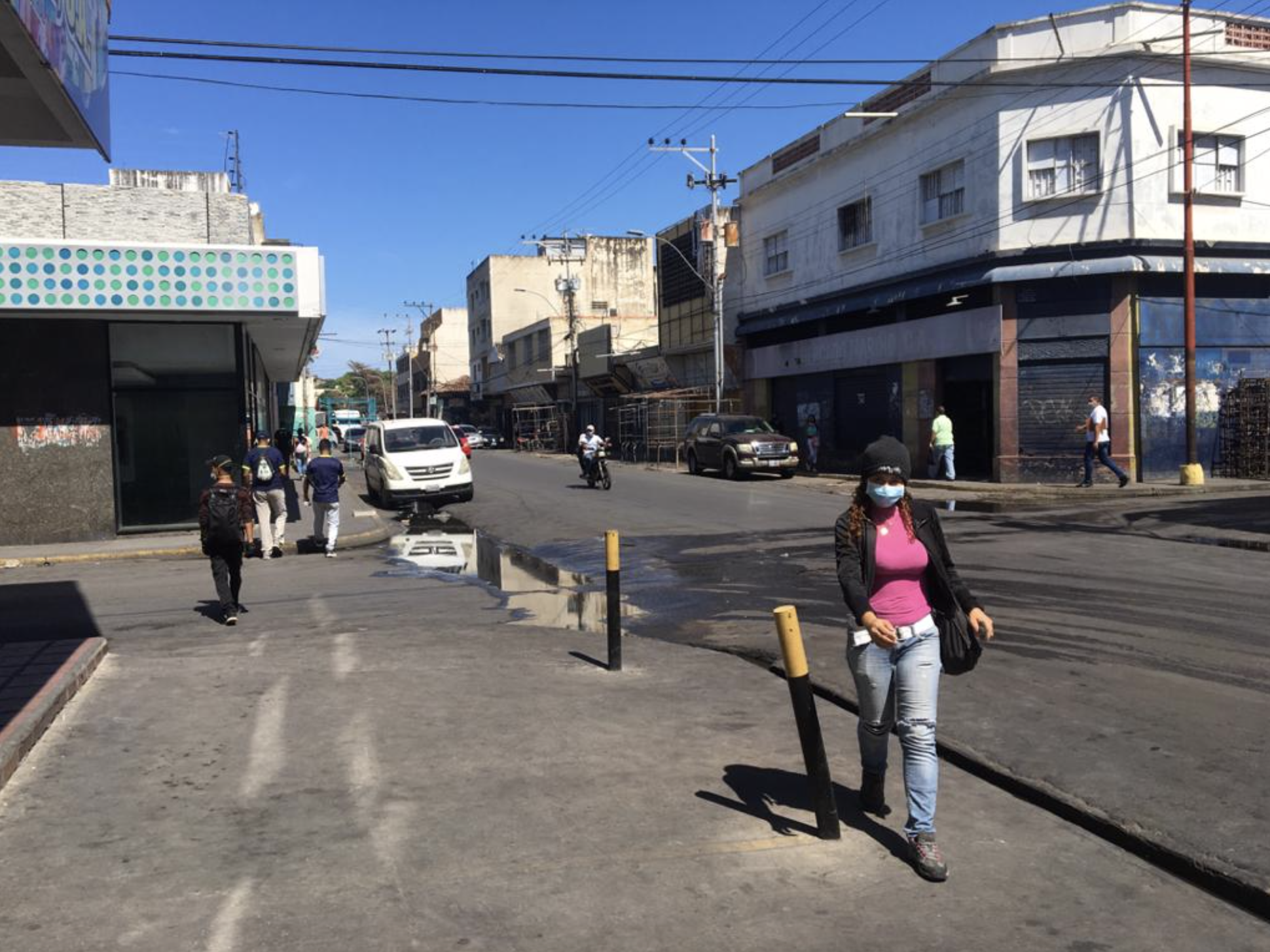No Food or Fuel, Just Homemade Masks: Quarantine in Cumaná
It’s hard to comply with mandatory isolation in Cumaná, the capital of Sucre State. Without food, fuel or cooking gas, people must improvise so they can eat amid a pandemic.


Photo: Nayrobis Rodríguez.
Irene Marín bought two homemade facemasks from her neighbor, a seamstress, for herself and her husband. Although she’d like to comply with the quarantine imposed by Nicolás Maduro’s administration to avoid the spread of COVID-19, she just can’t stay locked inside her home for over two days: she’s a school teacher and her income isn’t enough to buy food for more than three days. She has to find a way to make ends meet.
Maduro’s call for social distancing found many people in the same situation. Since Monday, March 16th, Irene obeyed the quarantine, but in the morning of March 18th she was forced to go out: “We ate the sardines with arepas yesterday for lunch and dinner; we don’t have food anymore.”
The streets of Cumaná, capital of Sucre state in northeastern Venezuela, are filled with people using homemade facemasks, made from different types of fabric and a variety of models, since the ones you usually buy at pharmacies aren’t available anymore. People go out for food despite the official order: “Ideally, people should buy their groceries in establishments close to their homes,” says bioanalyst María Rodríguez, “to avoid spreading and catching the disease.”
But the economic crisis shows no mercy for the pandemic. Irene doesn’t have a car and depends on public transportation to go from eastern to downtown Cumaná, a route that can take half an hour. Most bus drivers are using facemasks and they don’t let you on the bus if you don’t have one.

“The streets of Cumaná, capital of Sucre state in northeastern Venezuela, are filled with people using homemade facemasks, made from different types of fabric and a variety of models, since the ones you usually buy at pharmacies aren’t available anymore.” Photo: Nayrobis Rodríguez.
This measure was taken on Monday the 16th, and it’s been obeyed almost entirely. The same goes on in Cumaná’s Municipal Market, one of the most visited places every day. Merchants and customers all abide by the use of facemasks and the 6:00 to 11:30 a.m. schedule to buy goods, declared by the expense administration of Cumaná’s Mayor’s Office.
“The market’s main gates are closed,” says Jorge Velázquez, a customer. “Everyone has to go in through the trucks’ unloading area, and there are police officers checking if you have a mask. Inside, people do their shopping in peace, but they don’t really keep a safe distance from each other. Some take off the mask to smoke and others run their sweaty hands over their foreheads.”
The different prices between areas makes it inevitable for people to go around looking for better deals. A kilo of beef in the Valentín Valiente parish, for example, costs Bs.S. 280,000, while the price downtown is BsS. 230,000.
In spite of the restrictions on transit, with checkpoints from the National Guard in strategic places, people keep trying to go out on the street. The most affected are those living in the outskirts and beyond, in the border with Anzoátegui State and the road between Cumaná and the town of Carúpano. For them, access to Cumaná is even more restricted.
Further Constraints
Since Tuesday, March 17th, the second day of quarantine, the measures taken by governor Edwin Rojas to avoid the spread of COVID-19 gradually intensified. At first, they blocked access to Monagas and Anzoátegui, also suspending traveling by boat to Trinidad and Tobago. Gatherings in open and closed spaces were banned, as well as drinking alcohol in public places and establishments.
In spite of the restrictions on transit, with checkpoints from the National Guard in strategic places, people keep trying to go out on the street.
The following day, all stores were forced to close at 1:00 p.m. The National Guard and national police officers (PNB), speaking through megaphones on their trucks, were in charge of enforcing this rule, including at grocery stores and pharmacies.
On Wednesday, the regime’s measures included suspending gasoline supply for citizens and, later that afternoon, all gas stations were closed. Other basic services were suspended, too: the office of PDV Comunal, a state institution in charge of distributing cooking gas, closed its doors. People in Cumaná don’t know what they’re going to do for a gas canister. Between January and February, at least six demonstrations were registered per week in areas where demand for canisters is high.
For the first three days of quarantine, Sucre’s Regional Foundation for Health (FUNDASALUD) had tested about 80 possible cases of the virus, according to governor Rojas. As of Wednesday, March 18th at 9:00 a.m., they had all come out negative, and there were new cases to be studied —although he didn’t say how many.
We don’t know whether there are plans to distribute food to the most vulnerable. We only see more and more constraints.
Caracas Chronicles is 100% reader-supported.
We’ve been able to hang on for 22 years in one of the craziest media landscapes in the world. We’ve seen different media outlets in Venezuela (and abroad) closing shop, something we’re looking to avoid at all costs. Your collaboration goes a long way in helping us weather the storm.
Donate




